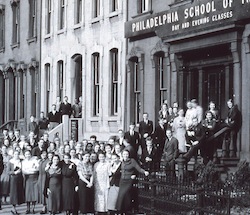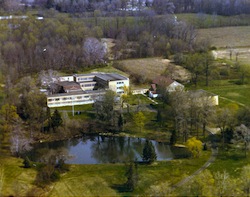[dropcap3]I[/dropcap3]n a world that changes so fast it takes our breath away, what could be more reassuring? Change is our life, whether we like it or not, but God remains stable. As Cairn University celebrates 100 years, change and stability walk hand in hand through her history. In early 1914, a group of prominent Bible teachers including C. I. Scofield held a Bible conference in Philadelphia that resulted in a Bible school. When Scofield was asked by local reporters why he would establish such a school, he said “(We) felt … that the great host of Sunday school teachers and mission workers shall have clear and competent instruction in the Scriptures and in the best methods of Christian work.” In other words, the work of reaching the world for Christ and making disciples could only be effectively done by laymen if they were properly educated in the Scriptures. Scofield said there were seminaries for ordained pastors, but the work of Christ needed trained laymen and women. This school that was founded to train laymen was the Philadelphia School of the Bible.
The year before, 1913, W.W. Rugh saw the same need and started a Philadelphia extension of the National Bible Institute of New York to train laymen in the Scriptures. In 1923, that extension became the Bible Institute of Pennsylvania. By 1933, the stated purpose of the school was “to give young people a foundational knowledge of God’s word and related subjects. Such knowledge is the basis of all righteous thinking and conduct. They are then better prepared to follow their chosen vocation and be upright citizens.”

Though many students of the ’20s and ’30s in both schools entered full-time ministry either in churches or missions, their study was often done at the end of the day after their regular job. Times were hard, money was scarce. Who could afford to take off three years to go to Bible school? Grads of those years talked of catching the trolley or train to Center City and studying the Bible at night. Those grads came from the churches of the region and formed the backbone of elder boards, Sunday schools, and youth ministries like Christian Endeavor.
Then the war came – WWII – and once again, the world changed. Soldiers returned from the overseas conflict with GI Bill money in one hand and a passion to reach the lost for Christ in the other. They had finances to pay for training and could enroll fulltime. A great missionary and local church movement emerged in the late ’40s and early ’50s. To meet that change, the two Bible schools of Philadelphia merged under the leadership of William Mierop and Clarence E. Mason to become Philadelphia Bible Institute (PBI), in a newly purchased building at 1800 Arch Street.
By the time of merger, 85% of the day school students of Philadelphia School of the Bible planned to enter full-time ministry. Interestingly, the Bible Institute of Pennsylvania founded by Rugh was just the opposite; only a few students planned to do so. It appears that the leaders of Rugh’s school believed they should continue to put the emphasis on lay workers. Philadelphia Bible Institute and its successor, Philadelphia College of Bible, continued more in the vein of Philadelphia School of the Bible for the next few decades.

With more students pursuing full-time enrollment, student life emerged. Both merging schools had begun a sports program in the late ’40s, but the ’50s saw the rise of intercollegiate sports at PBI. The first Student Council formed at each school in the 1949 academic year. In addition to their on-campus activities, students were involved in service in Christian ministries around the city. Music programs developed at both schools and expanded in the merger; the Chorale first performed in 1952, under the direction of Mr. Gordon Curtis. All of these student activities developed alongside a full academic program.
Dean Clarence E. Mason believed that biblical scholars were as academically equipped as scholars of any other discipline to work in any vocation, ministry or otherwise. He felt it was imperative to “get your Bible first” and encouraged the three-year graduates of the Institute to go on and finish a baccalaureate degree in a field of their choice. In 1947, the two schools helped found the accrediting body for Bible colleges (now Association for Biblical Higher Education); in 1958, PBI worked with the State of Pennsylvania to approve a four-year Bachelor of Science in Bible degree, the first of its kind in the state, changing the Institute to Philadelphia College of Bible (PCB). Finally, in 1967, the academic leaders led the charge to get full academic accreditation under Middle States Association. Mason was joined in his efforts by men like Charles Furness, who developed the Social Work program and eventually a Social Work degree, and Al Lunde and other leaders in the Music Department, who sought a Music degree. Ultimately, administrators who had been their students instituted degrees in education, business, and more.

PCB’s role in training men and women for “Careers with Christ” answered the need of the ’60s and ’70s, but the world continued to change. Increasingly, graduates found themselves working in the secular workplace or pursuing higher degrees that were not leading to traditional full-time ministry. Could a deep study of Bible form a foundation for any and all walks of life? Absolutely! The biblically trained business leaders, or social workers, or educators, or political leaders found they brought an understanding of people, of ethics, of life, and were able to infuse the spirit of the Lord into the more secular venue.
By the mid-’70s, costs of property in the city became prohibitive, and parents hesitated to send their students to an inner- city campus. The Board of Trustees voted to relocate the campus, and a search for a new campus began under Acting President Robert E. Marquardt. A new campus was bought in 1979 in Bucks County, right on the train line to Center City. Cairn University has now been in Langhorne longer than any of its previous locations.

The last 30 years have seen dramatic change in American society and across the globe. Church attendance is dramatically down in the West, while other religions are making power plays globally. Reaching the world for Christ is rarely as simple as inviting a friend to church. Today’s world needs biblically-trained laymen and women again who can take the message of eternal life into the workplace and into the hostile climate of a world that is post-Christian or deeply “other” religious. Even traditional missionaries are doing ministry differently, as visas are increasingly based on the skills a foreigner brings.
At the Cairn Global Mission Week in February 2013, Joshua Bogunjoko, International Director of SIM, challenged Cairn students to go into the world with a Bible in one hand and a marketable skill in the other. He said, “God has equipped you beyond any other generation because of what God has made available to you beyond any other generation. Will you respond to the marching orders of the Holy Spirit? Will you say, ‘God, as You do Your work in an international, interrelated, interdependent, and integrated Church, here am I, send me’?”
The world changes, but God does not. Jesus is the same, yesterday, today, and forever. It is our responsibility as followers of Jesus to respond to change in ways that will keep God’s Word as the highest priority, motivating all God asks us to do with our minds, our hearts, and our hands.
[framed_box]
Elizabeth M. Givens has served for nearly 40 years with SEND International (US and Asia) and has been on Cairn University’s Board of Trustees for 25 years. Dr. Timothy Hui, who has also served on the Board, is now Cairn’s Dean of Educational Resources. Liz and Tim were classmates at Cairn in the late 1960’s. [/framed_box]